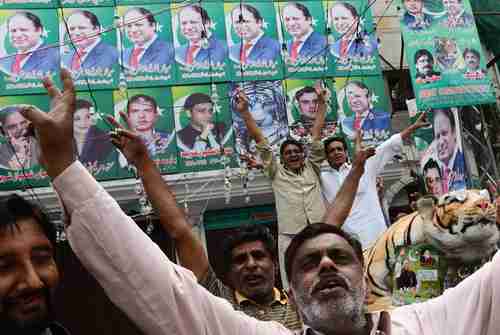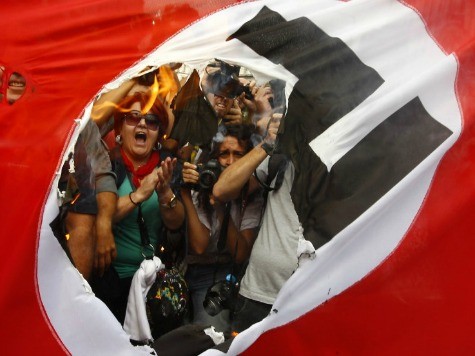This morning’s key headlines from GenerationalDynamics.com
- Pakistan celebrates election, but faces continued chaos
- Euro finance ministers hold Greece’s feet to the fire
- Greece’s government prepares to demand war reparations from Germany
Pakistan celebrates election, but faces continued chaos

Nawaz Sharif supporters rejoice in election victory (AP)
Voters ignored terrorist threats in Pakistan on Saturday, and turnedout in historically large numbers for a historically importantelection: The first election in Pakistan’s history leading to apeaceful transition from one civilian government to another. Hopesare high that the winner, Nawaz Sharif, will keep his campaignpromises to eliminate corruption from the government, will restore theeconomy, and will end terrorist attacks by the al-Qaeda linkedTehrik-e-Taliban Pakistan (TTP), the Pakistan branch of the Taliban.
However, an Indian analyst says that the optimism is misplaced, andpoints to the following:
- There were thousands of civilians killed in TTP terrorist attacks in 2012, and almost a thousand so far in 2013.
- Pakistan’s army continues a dual policy of condemning some terrorist groups while implicitly supporting and protecting leaders of other terrorist groups.
- Pakistan remains a big draw for foreign jihadists, especially in the tribal border areas. Estimates indicate that there could be around 3,000 foreign fighters, drawn from some 30 countries.
- Conflicts between Pakistan’s three branches of government — the judiciary, the executive, and the army — are reaching alarming proportions. The judiciary has ordered some politicians to be jailed for corruption or contempt of court, and the orders haven’t been obeyed. And the return from exile of former prime minister and former general Pervez Musharraf to Pakistan has pitted the judiciary, which wants to prosecute Musharraf, against the army, which wants to protect Musharraf.
- Afghanistan has tried to establish peaceful relations with Pakistan but, according to one Afghan commentator, “They fire rockets, they send terrorists to our soil, they destroy our jihadi leaders, clerics, influencers, our mihrabs (religious places), our tribe, our mothers, sisters, brothers, students, children, soldiers and police.”
The last point is particularly relevant to the generational analysisof President Barach Obama’s military “surge” into Afghanistan in 2009,with the intent of duplicating the success of President Bush’s “surge”strategy into Iraq in 2007. However, as I’ve written several times inthe past, the generational situation in Afghanistan is very differentthan in Iraq, and there are significant differences that will preventthe surge strategy from working there. (See “2-Sep-12 World View — U.S. decision on Haqqani Network will affect Pakistan relations”)
The Taliban are Sunni Pashtun militants. Even if they are inclined tolive peacefully in Afghanistan after the Americans leave, the SunniPashtun Taliban (the TTP) just across the border in Pakistan will notlet them. That’s why the last point above is an important part of thechaos in Pakistan.
From the point of view of Generational Dynamics, the biggest and mostimportant difference between Iraq and Afghanistan is that Iraq’s lastgenerational crisis war was an external war (the Iran/Iraq war,1980-88), while Afghanistan’s last generational crisis war was abloody, genocidal civil war (1991-96). That’s why the “surge” couldwork in Iraq, but not in Afghanistan: No negotiations will heal theanimosity between the Pashtuns and the Hazaras, who tortured,mutilated, raped and killed each other less than 20 years ago.
Finally, as I’ve written many times, Generational Dynamics predictsthat Pakistan and India are headed for a major war re-fighting thebloody 1947 war between Hindus and Muslims that followed Partition,the partitioning of the Indian subcontinent into Pakistan and India.BBC andSouth Asia Terrorism Portal (SATP)
Euro finance ministers hold Greece’s feet to the fire
The Eurogroup of eurozone finance ministers approved on Monday theconditional release of Greece’s next two bailout installments,totaling 7.5 billion euros. Greece will receive 4.2 billion euroslater this week, pending final approval. But the next payment of 3.3billion dollar installment, scheduled for the end of June, will not bepaid unless Greece’s government first fires 2,000 civil servants, aspart of a previous commitment to reform the civil service. What’sgoing on here is that the Europeans are no longer willing just to anentire loan payment, 7.5 billion euros in this case. Instead, theEuropeans are splitting up the loan tranches into “sub-tranches,” andrequiring fulfillment of specific commitments, such as civil servicefirings, for each one. This is not making the public happy, and soGreece’s prime minister Antonis Samaras is attempting to quell publicanswer by promising that Greece’s economy will improve so much byearly 2014, that they can return to the public bond market again, andstart borrowing money again and spending it as much as ever. This isthe same kind of promise that the Europeans have been making everyquarter for the last four years. I don’t know how many Greeks believein the tooth fairy, but that kind of credulity would be required tobelieve Samaras. Kathimerini and Reuters
Greece’s government prepares to demand war reparations from Germany
Greece’s government has compiled an 80-page report making the case todemand World War II reparations from Germany. Stories of Naziatrocities and war crimes are now being widely reported and discussed,in particular the mass slaughter of 498 men on December 13, 1943, inone of the worst crimes of the war. In addition, the report demandsrepayment of a loan that the Nazis forced to make to the Greeks duringthe war, but never repaid. The total demand may be as high as 162billion euros, which would allow Greece to pay off its debts. Thiswould be a total disaster for Greece, because it would gorge itself onmoney and be in worse debt than ever before long.
However, the Germans point out that the Greeks defrauded the EuropeanCentral Bank and the European Union when it joined the euro in 2001,reporting fraudulent deficit figures. BBC
Permanent web link to this article
Receive daily World View columns by e-mail

COMMENTS
Please let us know if you're having issues with commenting.